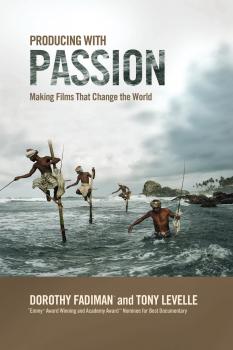Кинематограф, театр
Различные книги в жанре Кинематограф, театрBankroll
There is one golden rule in Hollywood: He who has the gold makes the rules. At the end of the day, a film can have every other element in place, yet if it lacks financing, it's never going to happen. This book explains how to get the gold.
Digital Video Secrets
This essential resource reveals the 100 simple secrets of shooting digital video. The work is filled with practical how-to information, and shows the first-time filmmaker how to get the most out of digital cameras.
Producing with Passion
Documentary filmmaker Fadiman chronicles her more than 30 years of experience searching out practical approaches to get her productions funded, finished, and seen, balancing inspiration and commitment with financing, shooting, editing, and promotion.
Mass Media in the Post-Soviet World
This collection covers the major trends of the media environment of the post-Communist world and their recent development, with special focus on Russia and the post-Soviet space. The term ‘media environment’ covers not just traditional print and electronic media, but new media as well, and ranges from the political to entertainment and various artistic spheres.
What role do market forces play in the process of media democratization, and how do state structures regulate, suppress, or use capitalism toward their own gain? What degree of informational pluralism has been achieved in the newly independent republics? What are the prospects for transparency and the participation of civil society in Russian and Eurasian media? To what degree do trends in post-Communist media reflect global trends? Is there a worldwide convergence with regard to both media formats and political messaging?
Western observers usually pay their keenest attention to the role of media in Russia and Eurasia during national elections. While this is a valid focus, the present volume, with contributions by Luca Anceschi, Jonathan Becker, Lee B. Becker, Michael Cecire, Marta Dyczok, Nicola Ying Fry, Navbahor Imamova, Azamat Junisbai, Barbara Junisbai, Kornely Kakachia, Maria Lipman, Oleg Manaev, Marintha Miles, Olena Nikolayenko, Sarah Oates, Tamara Pataraia, Elisabeth Schimpfossl, Abdulfattoh Shafiev, Jack Snyder, Tudor Vlad, and Ilya Yablokov, aims at understanding the deeper overall ‘media philosophies’ that characterize post-Soviet media systems and environments, and the type of identity formation that they are promoting.
Slay the Dragon
Writing for the multibillion-dollar video-game industry is unlike writing for any other medium. Slay the Dragon will help you understand the challenges and offer creative solutions to writing for a medium where the audience not only demands a great story, but to be a driving force within it. Aimed at traditional writers who want to learn interactive narrative as well as game creators who want to tell better, more emotionally involving stories, the book is written by two creative veterans of both Hollywood and «Nerdyhood.» Through lively discussions and self-paced-exercises, Bryant and Giglio step you such topics as: the «no-act» structure of video games; writing great game characters; making gameplay emotionally meaningful; and bringing your game world alive.
Create Your Own TV Series for the Internet-2nd edition
A first of its kind, all-in-one guide to creating short-form TV series for the Internet. Written in a hip and entertaining style in the language of the cyber generation, this book guides the aspiring videomaker from an initial series idea through writing, production, and uploading and marketing a polished pilot and successive episodes of his or her own original Internet TV series.
Master Shots Vol 2
This is the ChineseSimplified version. Dialogue scenes are the most important moments in your film, but most directors get them wrong.
If you block your scenes well, you do more than capture the basic scene; you echo the meaning, emotion, and drama of every moment. That is never more important than with dialogue.
Whatever your budget, there is an exciting way to capture dialogue.
It is a tragedy that so many directors are happy to open a scene with a moving master shot, and then just settle into dull coverage for the dialogue. You can do better than that and Master Shots Vol 2 gives you 100 ways to shoot dynamic dialogue.
40 Questions of One Role
A method of questions? A question of method. Alongside any method proposed in this book, the whole system of theatre only makes sense if it is understood creatively, not dogmatically. You can expect to find questions, but not necessarily complete or ready-made answers. Questions should serve as the fundamental key to unlocking potential. The technique to ask questions about a role will enrich actors and directors, leading them to discover the rare, living quality of role, challenging their initial ideas and even causing one's own Perestroika. Take a chance and you will discover an amazing world within the role, full of different puzzles and mysteries, which carry thousands of answers in themselves – sometimes we grasp them in the first few seconds, sometimes never.
For author, director and acting pedagogue, Prof. Dr. Jurij Alschitz, the independent prerogative of the actor as the protagonist of a modern, living, theatre stands in the foreground. 40 Questions of one Role promotes autonomy in the process of creation and within this book, directors and pedagogues alike will find inspiration and support for their own preparation, as well as the rehearsal and teaching process as a whole.









